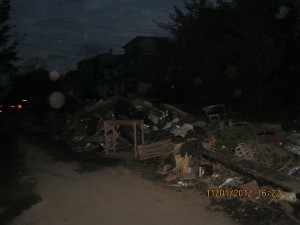Animal
November 2, 2012
For downtown residents, the last few nights of blackout have primarily brought a continuation of daytime inconveniences and an eerie break in routine–drinks by candlelight, watching NYU students line up for a waffle truck on E. 14th St., that sort of thing–but there’s little doubt anywhere in Lower Manhattan that the lights will be back on soon. For poorer New Yorkers living in Sandy-devastated areas further afield from the seat of finance, there is no such confidence that power—or anything else passing for a semblance of normalcy—will return anytime in the near future.
Last night, out in pitch-blackened Rockaway, sections of which are still submerged, residents were especially nervous on that count (when you drive over the Marine Parkway Bridge from Brooklyn, you’re hit by a strong ashen smell that can only be from the some eighty burnt-down houses in nearby Breezy Point).
Standing in front of his sister’s severely damaged property on 137th and Cronston, 44-year-old Thomas Callahan, whose home and business had both been flooded out, was asked when he expected power to return. “It could be up to thirty days and we have no gas for generators,” he said. A creeping cold was settling in as he estimated that “eighty percent” of his neighbors had not evacuated, as the majority of them had heeded official warnings and left before hurricane Irene hit last year, an event which wound up causing the peninsula little damage. “That gave them a false sense of security, so they stayed. Even the older folks,” Callahan added, puffing on a cigarette.
But this time, he said, the water came up so high, “kids were kayaking through the neighborhood.” The damage that water wrought was all around: knocked down trees, piles of rubble, and bombed out yards.
Further west, on Rockaway Beach Blvd, a dozen people were huddled near a closed gas station waiting for a bus in the pitch darkness. None of them had flashlights. They had been waiting for forty minutes, said one, Kevin Smith, who had spent three and a half hours getting into Manhattan that morning so he could find a place to work with power. Asked about the restoration of heat, water and electric, Smith–who like many on the peninsula, lives in a large apartment complex and has no running water–said, “I think that’s something we’re all very concerned about, and a lot of the residents around here just weren’t prepared, no flashlights candles or nothing.”
Just down the block on Beach 116th St., the Food Dynasty had reportedly been looted; out front, groups were huddled around the only working generators I had seen in the neighborhood. The newly refurbished boardwalk on that stretch has been completely obliterated, sign poles twisted like tinker toys. Karol Materna and his girlfriend, Joanna Jocsjeski, both 16, were exploring the beachfront. “It’s fucking scary out here, its crazy,” said Materna, who was unlucky enough to have a basement apartment. “I lost everything.”
Asked about the return of power, Jocsjeski shook her head, saying, “In my building [Dayton Towers], they’re saying Christmas.” According to an electrician I know, this rings true, as many private building complexes have “integral electrical systems” in their basements that were destroyed in the floods.
Further west still, towards the Hammel projects, the situation seemed even more chaotic. Some streets in the 100s—comprised of lines of small private houses—were completely submerged by up to four feet of black water. There was no official presence visible whatsoever. Unlike in Callahan’s neighborhood, the water hadn’t receded, and no clean-up effort had begun. A group of Latino women were trying to hitch a ride over one of the bridges, but spoke very little English. One of them finally mustered enough words to explain: “We need to get a flashlight.”
In front of 7115 Beach Channel Dr., one of the large, completely darkened projects, a 50-something-year-old man who identified himself as “Romeo” was filling up a plastic bucket from the fire hydrant. He quickly explained a new routine. “What the hell does it look like I’m doing?,” he said. “I’m filling up this bucket so my girlfriend up there on the 6th floor can flush the toilet.” Asked if he thought Mayor Bloomberg, who had not yet travelled to the hard-hit peninsula, was doing a good job getting the Rockaways back on its feet, “Romeo” said “hell fucking no.” But there was a ray of hope, the man wanted me to know: “FEMA’s coming tomorrow.”
